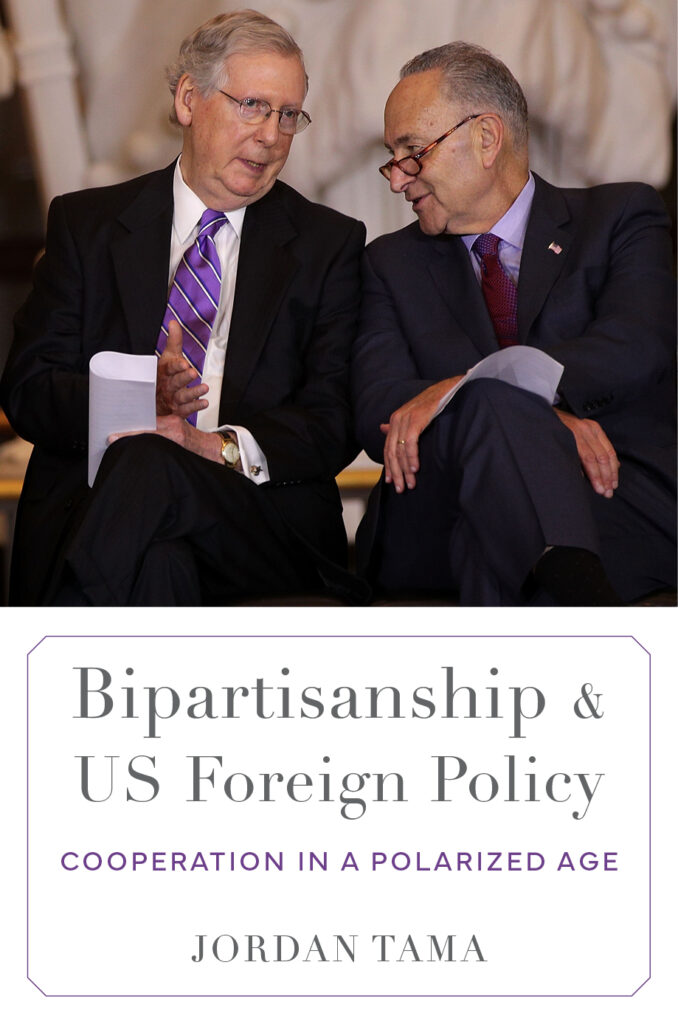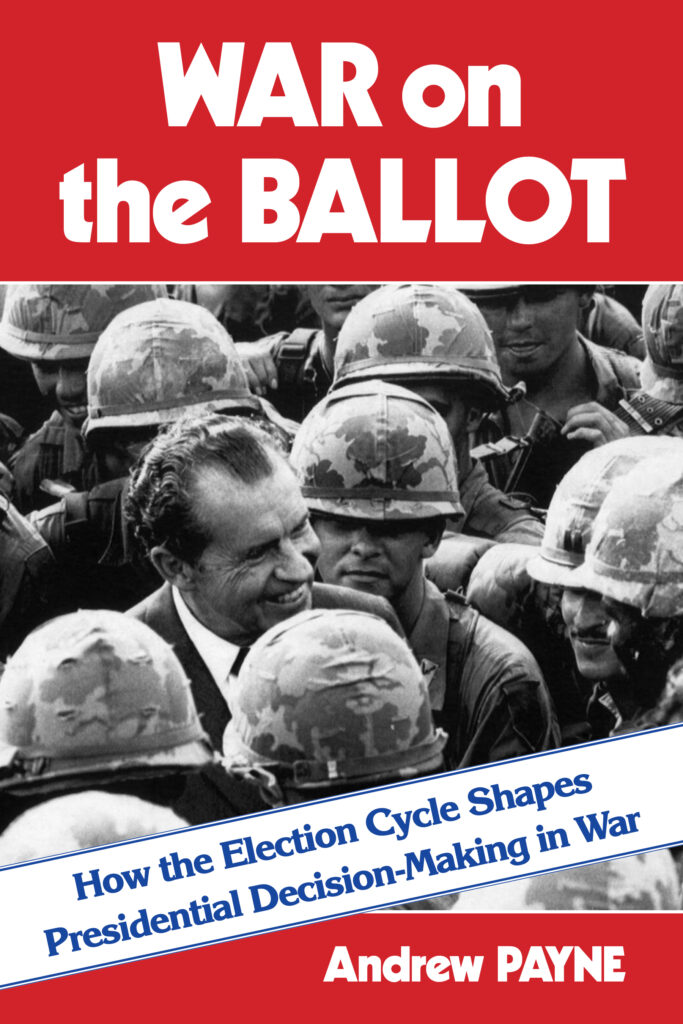
The U.S. is once again in a countdown to a government shutdown. Shutdowns (or shutdown threats) have been a regular feature of U.S. politics in the last decade. But this round has been a little different, because U.S. foreign policy is more directly involved. The House GOP’s divisions over aid to Ukraine nearly led to a shutdown last month. And since former Speaker Kevin McCarthy’s (R-Calif.) downfall in early October, the attack on Israel and its response in Gaza has put international conflict squarely in the headlines and on Congress’s agenda. Recent polling has suggested that President Biden’s embrace of Israel may cost him politically, but the long-term political effects are difficult to forecast.
In this “good chat,” we bring together two American politics specialists at Good Authority, Michael Tesler and Sarah Binder, and two authors of recent books on the politics of U.S. foreign policy. Jordan Tama is Provost Associate Professor in the department of foreign policy and global security at American University, a nonresident senior fellow at the Chicago Council on Global Affairs, and author of Bipartisanship and U.S. Foreign Policy (Oxford University Press, 2023). Andrew Payne is a lecturer in foreign policy and security at City, University of London, a research associate in the department of politics and international relations at the University of Oxford, and author of War on the Ballot (Columbia University Press, 2023).
Elizabeth N. Saunders: Sarah, let’s start with the state of play (as of Nov. 13, when we met to chat). Where does supplemental funding for Ukraine and/or Israel stand?
Sarah Binder: At this point, aid for Israel and Ukraine is stuck in neutral in Congress. Earlier, it seemed that Congressional leaders might graft emergency aid for Ukraine, Israel, and Taiwan – alongside humanitarian aid for Gaza, Israel, and Ukraine – onto a continuing resolution. That’s the stopgap spending bill that Congress and the president would need to enact into law by 12:01 AM November 18th if they want to keep the government’s lights on.
But new House Speaker Mike Johnson (R-La.) severed the foreign aid package from the GOP leadership’s proposed continuing resolution.
Why sever aid from a continuing resolution, given that the resolution is a “must pass” measure to avoid a government shutdown? Back in September, it looked like an aid package for Ukraine might hitch a ride on a continuing resolution. But that doesn’t seem tenable now.
Both policy issues divide the parties. With respect to Israel, the House has already passed a bill providing about $15 billion in aid for Israel requested by the Biden White House. But a partisan ploy (“paying for” the package with cuts to the IRS that would cost the government revenue) led almost every House Democrat to vote against the bill and has left it in limbo in the Senate.
Add in House and Senate Republican divisions over whether to send further aid to Ukraine, and it seems the aid package was too heavy a load for a continuing resolution to bear. The politics of funding the government with another continuing resolution are perilous enough in the House without the added challenges of reaching agreement on aid to Israel and Ukraine.
And if those hurdles weren’t enough, GOP senators set a price for their votes on Biden’s emergency aid requests. GOP senators are demanding changes to immigration policies to overhaul how migrants and asylum seekers are processed at the U.S.-Mexico border. A small bipartisan group of senators is discussing potential changes, but there’s not yet been a meeting of the minds on reforms that would be acceptable to both parties and the White House.
Saunders: Jordan, your new book, Bipartisanship and U.S. Foreign Policy, forces us to think about the many ways parties line up (or don’t) on foreign policy. How should we understand the current standoff over Ukraine policy within the GOP?

Jordan Tama: We often think about bipartisanship as involving unity in Washington, but the reality is that bipartisan cooperation often coexists with intraparty division. That’s what we’re seeing today on Ukraine policy.
The Biden administration, Democrats in Congress, and internationalist Republicans – such as Senate Minority Leader Mitch McConnell (Ky.) and presidential candidate Nikki Haley – strongly support continued high levels of aid to Ukraine. But the MAGA wing of the GOP, led by Donald Trump, is pushing to end or reduce U.S. support for Ukraine.
This intraparty GOP disagreement reflects a broader debate within the party over America’s role in the world, between proponents of a Reaganite, hawkish internationalism and advocates of a more inward-looking, “America first” vision. This is a long-standing debate within the party, but the isolationist strand has grown much more substantial in the Trump era.
Yet while the America firsters have the momentum in the GOP, the internationalists are still putting up a real fight. And it’s striking that Nikki Haley is gaining some ground in the GOP primary even while arguing for a robust form of hawkish internationalism.
But if Trump regains the presidency, he will be able to argue that the American people favor his brand of nationalism and internationalist voices within the GOP will probably be weaker than they’ve been at any time since the 1930s.
Saunders: Sarah, what’s really going on here? Is this a dispute over policy, or political posturing?
Binder: It’s both policy and politics. It’s always hard to separate the two. On the one hand, there are real (and increasing) policy divisions within the GOP over further aid to Ukraine, as Jordan explains above.
But the disputes aren’t just on the GOP side about Ukraine. We’re also in real time witnessing the rapid emergence of seemingly deep Democratic divisions over Biden’s policy of stalwart support for Israel in its war in Gaza. Those are also policy disagreements, but on the Democratic side.
That said, lawmakers rarely separate policy from politics. Legislative leaders and their rank and file are always thinking about the electoral ramifications of policy issues. That means that lawmakers’ policy views – to the extent they hold clear preferences about an issue – don’t necessarily rule the day when they vote. Lawmakers can vote for popular things they oppose; other times they vote against unpopular measures they support. (That latter one is what Congress watchers call the “‘vote no, hope yes’ caucus” that rears its head periodically among the House GOP.)
Tama: I agree. If you look at a presidential candidate like Vivek Ramaswamy, he seems to be more opportunistic in his foreign policy stances. Two years ago he might not have had many foreign policy views, but he saw which way the wind was blowing.
At the same time, some political leaders do have strong views of their own on foreign policy. Joe Biden has long valued U.S. alliances and international engagement. Even Trump has been expressing the same ideas on foreign policy for decades – arguing that other countries (Japan in the 1980s, China more recently) are eating America’s lunch.
Saunders: Turning to Andy, against the backdrop of declining GOP support for Biden’s Ukraine policies, there’s been a lot of discussion about how the Israel-Hamas war might affect Biden’s reelection. Obviously the U.S. isn’t a direct combatant in either Ukraine or Israel, but your book, War on the Ballot, discusses the effect of the electoral cycle on war policy. What do you expect those effects to be in these cases?

Andrew Payne: You’re right that the U.S. doesn’t have boots on the ground, but so long as an issue attracts the public’s attention, there is electoral risk that presidents have to take into account. So when Biden is making decisions about both of these conflicts, he faces similar challenges to those that have faced many of his predecessors trying to manage the domestic politics of commitments to foreign wars.
On one hand, Biden is the commander-in-chief, so he has to pursue policies he thinks are in the national interest. On the other hand, he’s an elected officeholder, so when choosing policies, he has to weigh the political risks, both to his own personal political fortunes and to the viability of the policies in question.
What does that mean in practice? In the book, I trace how this balancing logic has shaped decisions about military and diplomatic strategy across 70 years of U.S. involvement in foreign wars. Depending on the strategic and electoral dynamics at stake, these political pressures have led presidents to variously delay, water down, or dial up decisions to escalate (or de-escalate) the level of commitment to a war. Both the timing and nature of U.S. military assistance can be significantly affected by the volatile politics of the electoral process.
Today, Biden is clearly committed to supporting both Ukraine and Israel, but there’s mounting pressure from those saying he isn’t doing enough and those saying he’s doing too much. So exactly how this plays out – whether he faces electoral incentives to delay, dampen, or dial up a proposed course of action – depends to a large degree on how the president weighs the balance of those risks.
Saunders: So you’re saying he has to please everyone and they want totally different things.
Payne: Right. Politics really doesn’t stop at the water’s edge. President Lyndon Johnson once said, “I’d hate like hell, though, to be such a statesman that I didn’t get elected.” And I think that touches on some of the interesting normative dimensions of all this. At some level, we want presidents to be responsive to the wishes of voters; that’s a core principle of democracy. But at the same time, there’s this notion that politics should somehow be separate from foreign policy.
The tea leaves are easiest to read on Ukraine, I think, because it follows a more traditional narrative arc of an opposition party growing tired of bearing the costs of funding a war.
Assuming events on the battlefield remain more or less as they are – essentially a stalemate – I think we’re most likely to see an intensification of the current political trend, in which the souring on the war by Republicans is making it increasingly hard for Biden to deliver on his promises of continued aid for Kyiv.
Whether we get some kind of additional package this week or next month, the Trump wing’s stranglehold on the Republican party means this is likely to get worse before it gets better. Under these circumstances, Biden will face incentives to delay new packages or water down the support he can offer, for example by requesting less than he might otherwise think is necessary. Or he might seek to rely on other means of assisting Ukraine that don’t require congressional approval – or the same level of scrutiny – such as enhanced forms of diplomatic support or even covert operations.
And of course Lyndon Johnson did pretty much that in Vietnam, focusing on covert operations and other “disavowable” actions in which he had little faith to ensure the status quo would hold long enough for his re-election to be assured.
If the situation changes – if there’s a meaningful opportunity for negotiations or if Ukrainian forces have a major breakthrough – then the political winds could shift again, triggering different electoral constraints.
Saunders: An interesting question is how various U.S. politicians will define “success” in Ukraine. Ukraine’s initial success in repelling Russia’s invasion seemed to move the goalposts to some sort of outright Ukrainian victory, but the perception that this summer’s counteroffensive has failed might mean that “success” will look like some sort of settlement that preserves Ukraine’s sovereignty. But once moved, it’s politically hard to shift goalposts back.
Payne: That’s exactly right. And it’s not a new dynamic. At the outbreak of the Korean War in 1950, even the isolationist wing of the Republican party initially expressed support for the Truman administration’s decision to intervene. But after the aims of the war expanded – from restoring the prewar status quo to reunifying the entire peninsula, and back again – critics lined up to lambast the president variously for failing to take the fight to the enemy or for needlessly shedding blood on foreign soil as a long stalemate ensued.
On the Israel-Hamas conflict, it’s much harder to predict how this will unfold, in part because the politics of the issue are so complex and in many ways unique. Unlike Ukraine or Vietnam, Israel is a country with which most Americans are familiar, and there’s a lot of history and prior beliefs that are baked into the American politics of that conflict.
For now, it seems Biden is relying on the muscle memory of potentially bygone days when he could count on strong bipartisan support for an “ironclad commitment” to Israel. But Biden is already feeling pressure from progressives to take a tougher approach with Israel’s Prime Minister Benjamin Netanyahu – perhaps by making aid conditional on certain guarantees about its use in the military campaign.
Saunders: Michael, you’ve written a lot about how foreign policy is rarely a major issue in elections. Is anything about the Israel-Hamas conflict different?
Michael Tesler: Yeah, it’s very unlikely that a foreign conflict where the U.S. is not taking significant casualties would have an influence on presidential elections. Public opinion research suggests that voters are much more likely to change their support for these foreign policies based on their prior support for the president who is guiding it than to actually change their votes. Ukraine is a good example here. Republicans have increasingly turned against aid for Ukraine since Trump started criticizing it in the spring of 2022. And I wouldn’t expect that issue to have much of any impact on the 2024 election.
But there are some good reasons to think that war in Israel might be a bit different. The conflict is deeply linked to two salient religious groups and, as a result, evokes more powerful emotions than more abstract foreign policies. My research shows that some voters will even change their votes when presidential candidates’ positions on issues that are linked to social groups (e.g., immigration and same-sex marriage) are highlighted in the campaign. So, I think it’s entirely possible that the Israel-Hamas war could have some small effects on the margins next year.
The politics are more perilous on this issue for Biden here, too. Recent surveys show that Democrats are much more divided over the Israel-Hamas conflict than Republicans. The latest YouGov-Economist Poll, in fact, revealed that Biden’s 2020 voters were evenly split in their sympathies between Israelis and Palestinians. So, it’s not surprising that Biden receives his lowest issue approval ratings among Democrats for his handling of the Israel-Hamas conflict. It seems like Biden may be vulnerable, then, to apathy and even some defections among groups who disapprove of how he’s handling the issue (e.g., young voters who are much less supportive of Israel than are older Americans).
Saunders: Pulling back a little, it seems clear from this discussion that these dynamics aren’t going anywhere, even after the immediate issue of supplemental funding for these wars is over. In an era of seemingly unchecked presidential power, there are still political constraints on what a president can do.
Tama: Yes, and in an era when the United States might not want to intervene with troops on the ground and prefers to use tools like military aid, Congress’s power of the purse may be increasingly relevant.
Binder: Such a good point about Congress’s power of the purse. But … are we grading Congress on a curve? The House has a brand new, untested speaker, Congress has failed to enact any of a dozen required spending bills into law, barely a peep from the Senate, and both parties face internal cleavages over aiding Israel and Ukraine. My sense is that Congress will yet come to an agreement on aid – and flex its power of the purse – but the road is even rockier than I imagined.
Tesler: Public opinion should constrain Biden more on the Israel-Hamas conflict since his base is split over the issue. To be sure, there probably won’t be sizable defections from his supporters over the issue – especially when Trump is even more pro-Israel. But any movement away from Biden over his position on Israel could prove decisive in a calcified political environment where the election figures to be extremely close.
Payne: And that raises a broader point about the impact of these constraints on the effectiveness of policy, and thus whether they’re a good or bad thing. Ultimately, a lot of that rests on how qualified we think the next president will be to manage these conflicts. Is it worse to have a more-constrained president with good ideas or a less-constrained president with bad ideas?



